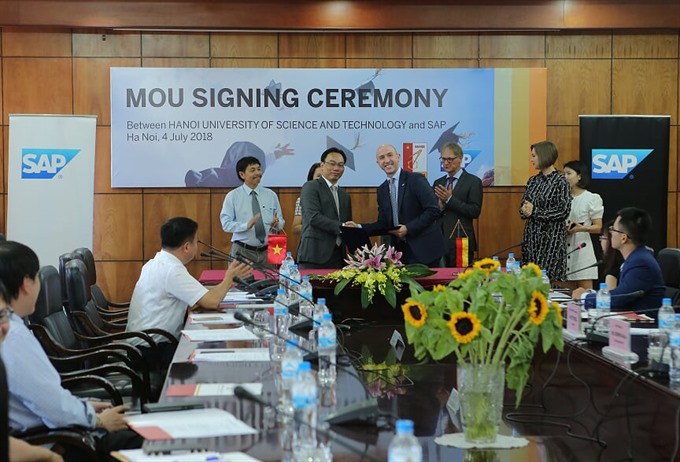HUST and SAP signed a MoU to help equip young Vietnamese talents with digital skills needed for the 4th Industrial Revolution.

The Ha Noi University of Science and Technology signed a memorandum of understanding with German software giant SAP on Wednesday to help equip young Vietnamese with the digital skills needed for the fourth industrial revolution.
HUST, Viet Nam’s first and leading multidisciplinary university, will collaborate with SAP to create programmes that will help upskill and prepare students for the IT labour market.
It will also offer them exposure to emerging technologies such as internet of things (IoT) and machine learning and teach soft skills like problem solving methodologies through Design Thinking.
The collaboration will benefit especially students in business, IT-related areas and the ELITECH programme.
Hoang Minh Son, HUST’s president, said: “Our university’s efforts to promote education, research and technology transfer in the age of the fourth industrial revolution is truly in line with SAP’s innovative approach to digital transformation and Design Thinking.
Besides being a leading enterprise in technology, SAP’s commitment to investing in digital skills for the future will surely help us in the goal of building a digital-savvy workforce.”
Scott Russell, president of SAP Asia Pacific Japan, said: “People are at the heart of digital transformation. At SAP, we strongly believe in purpose-drive innovation to help the world run better and improve people’s lives.
“Together with HUST, we are committed to building a strong, digitally-empowered Vietnamese workforce that is ready for Industry 4.0”.
Globally, SAP has been engaged in initiatives to support several of the UN’s Sustainable Development Goals (UNSDG).
With respect to the fourth goal of quality education, SAP’s University Alliances and SAP Next-Gen deliver open, continuous education to re-skill and advance the future workforce.
Viet Nam is all set to embrace the fourth industrial revolution, with Prime Minister Nguyen Xuan Phuc issuing a directive to all ministries and agencies to focus on developing infrastructure to invest in technological innovations until 2020.
Last year, he announced a target of having one million workers highly proficient in digital technologies by 2020. — VNS





